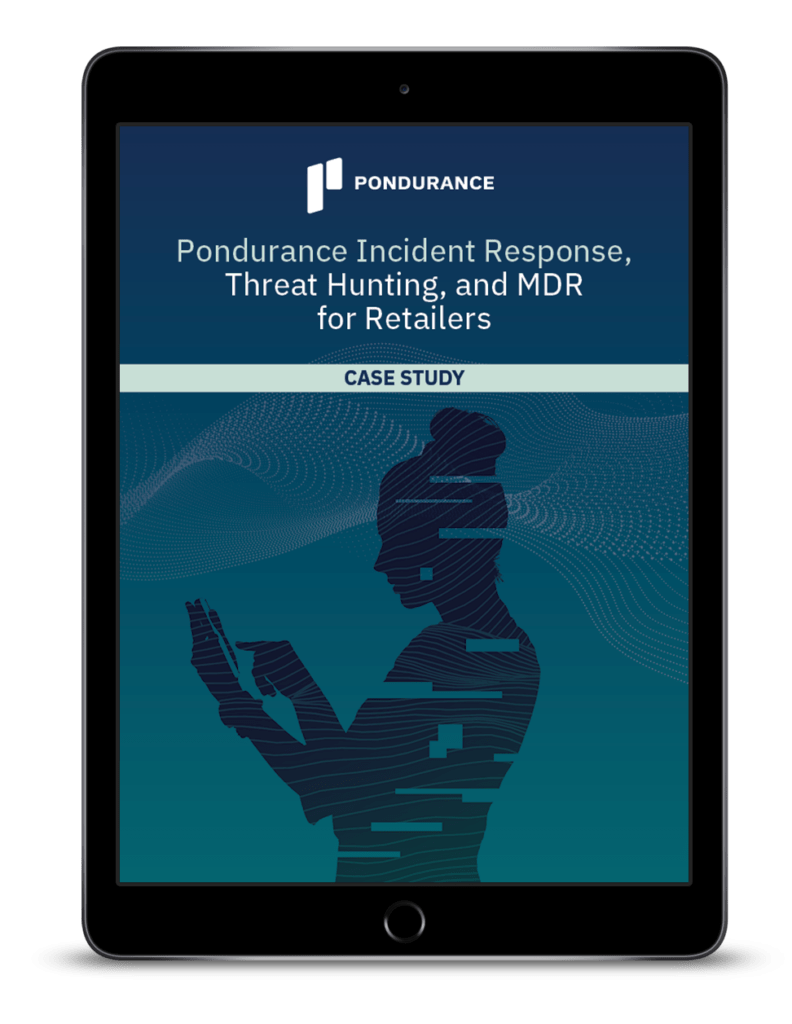Our privacy policy is located here.
Risk-Based Cybersecurity Services for Retailers
So you know your risk and how to protect your business and your customers
Integrates with your existing infrastructure and controls
24/7 U.S.-based security operations centers
360° visibility across networks, endpoints, logs, and cloud
Risk-Based Approach to Threat Management
eBook
- Exploring MDR’s history
- Simplifying the need for complex technology
- Fighting cyberattackers with human defenders
- Bringing the ‘R’ to MDR
- Customizing solutions for today and tomorrow
- Knowing compliance vs. cybersecurity
- Tailoring to your needs and budget
- Understanding your industry

eBook
Practical Cybersecurity: A Roadmap for Retailers
- The 5 key components of a sound cybersecurity foundation based on the NIST Cybersecurity Framework
- Industry best practices and solutions like risk management, incident response planning, and managed detection and response
- Tools to build an effective, practical threat management strategy

Additional Resources
Cybersecurity for Retail
As a target-rich industry fraught with abundant customer data, the retail sector has been a focal point for several cyber threats. Technological disruptions have expanded the attack surface, making the industry more susceptible than ever. Cybersecurity for retail has become an urgent priority to protect stakeholders’ trust and data privacy.
A comprehensive discussion on cybersecurity trends in the retail industry helps explain the urgent imperative to implement effective security measures. Emerging trends such as AI and big data analytics have given birth to sophisticated cyber threats, triggering an alarming rise in cases of data breaches, making the “cyber security in the retail industry” a critical issue that can no longer be downplayed.
By 2023, industry experts anticipate that retail cybersecurity trends will be shaped by self-learning AI-based cyber threat intelligence, risk-based cybersecurity approaches, and increasingly stringent compliance regulations, shaping the cybersecurity trends in the retail industry 2023.
Retailers face unique challenges in implementing cybersecurity measures, which underscores the importance of companies such as Pondurance. Pondurance’s risk-based approach to cybersecurity allows retail organizations to prioritize vulnerability management. They provide strategies that focus on the most imminent threats, ensuring customer data is safeguarded effectively.
One cannot discuss the nuances of retail cybersecurity’s without referencing the high-profile cyber-attacks that crippled renowned brands. Each case study sheds light on the devastating consequences of weak cybersecurity in retail, such as reputation damage, loss of customer trust, regulatory penalties, and financial loss.
Retailers regularly face the challenge of securing customer credit card information, and any dereliction can lead to severe consequences. This is where compliance regulations like PCI DSS come into the picture. These regulations are in place to ensure retailers maintain a secure environment for their customers’ sensitive financial information, minimizing the possibility of data breaches.
Apart from the presiding trends, the retail cybersecurity market’s size is also expanding exponentially. Cybersecurity investments are on the rise as retailers recognize the need to fortify their defence mechanisms against incessant cyber threats. To counter these cyber threats, retailers are increasingly outsourcing their cybersecurity needs to established vendors. Accentuating the increasing importance of cybersecurity for retailers.
In conclusion, retailers are recognizing the need for robust cybersecurity measures, and the retail cybersecurity industry is evolving at an unprecedented pace. As we surge forward, the call to action is clear – Implement a risk-based approach to cybersecurity, keep abreast of the latest trends, comply with necessary regulations, and outsource cybersecurity needs to experts when necessary. This holistic strategy will aid retailers in managing cybersecurity threats effectively, safeguarding their business and customers.
Retail businesses know the risks associated with protecting customers, and abiding by pci dss requirements. With a strong risk management strategy, large retailers can protect both the customer experience, as well as sensitive information, like credit card data.
Retail Cyber Attacks
The discipline of cybersecurity in retail is a rapidly evolving field requiring continuous evaluation as it is a favoured target for cyberattacks. The avalanche of transactions, payment credentials, and personal customer data stored and processed by retailers draws cybercriminals in hordes. Understanding the multifaceted nature of retail cyber attacks is a step toward mastering the craft of protecting a business.
As one pores over recent cyber attack news today in 2023, it becomes crucial to recognize the severity and impact of these predicaments on retailers’ operations and reputations. Recent cyber attacks in 2023, particularly in the USA, have been brazen, underscoring the urgent need for robust security strategies.
The retail cyber attacks 2023 list is diverse and sobering. It covers assorted modes of penetration: malware, data breaches, ransomware, each with its unique strategies and consequences. A detailed examination of recent cyberattacks reveals that data breaches primarily result from weak, stolen, or compromised credentials. Ransomware, on the other hand, stems from penetrating vulnerabilities in networks and encrypting data for ransom.
These cybersecurity attacks have a significant impact on retailers, causing severe fiscal losses and undermining consumer trust. Recent retail cybersecurity statistics paint a starker picture, indicating an escalating trend in cyber attacks against retailers.
Companies like Pondurance are stepping in to help retailers navigate this challenging landscape. Pondurance’s risk-based approach targets the core areas of vulnerability by imbibing advanced threat intelligence, vulnerability management, and incident response to safeguard customer data. This proactive method enables retailers to accentuate their defenses and concentrate on their core business operations.
The retail sector is also governed by certain compliance regulations such as the Payment Card Industry Data Security Standard (PCI DSS). These guidelines aim to ensure secure card transactions and protect cardholder data, thereby safeguarding customers’ sensitive information.
Retail cyber attacks constitute a poignant part of the broader cybersecurity panorama. They serve as stark reminders of the cumulative vulnerabilities and threats that the digital era has ushered in. As cyber risk escalates, retailers must prioritize robust cybersecurity measures, adapt to evolving threats, and safeguard their customer trust. Hence, cybersecurity is not a choice but a necessity for the retail industry today.
Retail Cybersecurity Solution
Stepping into the retail industry’s intricate world, one area persistently surfaces as a region of utmost concern to both small and grand-scale enterprises: cybersecurity. The necessity for retail cybersecurity solutions is apparent in the wake of recent retail data breaches, which reveal a frightening trajectory of increased cyber vulnerability.
Diving deep into the murky waters of retail cybersecurity statistics by year, a steady rise in incidents of cyber intrusion is noted. These occurrences, often manifested in the form of calamitous retail ransomware attacks, put forth detrimental threats to the retail industry, affecting its credibility, financial sufficiency, and consumer trust in a significant way.
Moving forward, the core cybersecurity challenges for the retail sector aren’t merely technical but revolve around a trio of preservation: integrity, privacy, and availability. These elements, when compromised, toss the retailers into undesirable circumstances, escalating into dire consequences.
In response to these escalating threats, many companies turn to reputable vendors such as Pondurance for robust cybersecurity solutions. Pondurance offers a risk-based approach to cybersecurity, prioritizing the areas of highest vulnerability. This effectively creates a secure sphere around the most sensitive data and serves as a robust shield against potential cyber adversaries.
Shedding light on the compliance regulations for the retail sector, mention must be made of standards such as the Payment Card Industry Data Security Standard (PCI DSS). These regulations are more than a mere requirement; they serve to fortify the virtual walls, ensuring clients’ sensitive information is adeptly protected.
In conclusion, the key to overcoming cyber threats in the retail industry lies within the utilization of comprehensive security solutions and practices. This includes outsourcing cybersecurity to organizations like Pondurance that provide a tailored approach to handling each unique cyber threat identified, feeding into the evolving needs of the retail industries and assisting them to ward off potential threats effectively.
Why is Cybersecurity Important in the Retail Industry?
Understanding the significance of cybersecurity in the retail industry is vital, especially considering the upward trend in data breaches in this sector. As retail industry cybersecurity continues to evolve, it’s critical to understand why retailers are becoming prime targets for data breaches.
In the age of digital transactions, retailers store an abundance of valuable customer data, from credit card details to personal information. This data trove attracts cybercriminals, eager to exploit any vulnerability within a retailer’s cybersecurity framework. Recent retail data breaches substantiate the urgency of this matter, demonstrating the devastating consequences for retailers and their customers.
Today’s retail cybercriminals employ an arsenal of sophisticated attacks designed to infiltrate data-heavy systems. Techniques range from malware infections, payment card skimming, to DDoS attacks, all posing various levels of threat to both retailer and consumer. Managing such threats, however, is far from straightforward. Retailers often face unique challenges in cybersecurity, like maintaining security over rapidly evolving technological interfaces, managing internal threats, and ensuring regulatory compliance.
Faced with these issues, many retailers are now choosing to outsource their cybersecurity to seasoned vendors like Pondurance. Companies like Pondurance excel in proposing risk-based approaches to cybersecurity. This service allows retailers to focus on their most acute areas of vulnerability and maintain the integrity of their customer data. Harnessing their expertise can aid in navigating complex compliance regulations such as the Payment Card Industry Data Security Standard (PCI DSS), which have been developed to safeguard sensitive payment card information.
Cybersecurity for the retail industry is, evidently, an issue which cannot be underestimated. The potentially vast impact of data breaches on a retailer’s customer base mandates a robust cybersecurity posture. By bolstering security measures, retailers can protect their sensitive data, preserve their brand image, and most importantly, maintain the trust of their customers in an increasingly cyber-threatened age.
Do Retailers Need to be PCI Compliant?
Retailers, functioning as a fertile ground for cyber-attacks, are necessitated to vigilantly uphold cybersecurity measures. Pondurance, an eminent cybersecurity service provider, adopts a risk-centric approach, allowing retailers to prioritize safeguarding prime areas of vulnerability, thereby ensuring that customer information remains un compromised.
PCI DSS compliance stands as a mandatory regulation for retailers in the arena of cybersecurity. This regulation aims to fortify retailers’ security posture against potential cyber threats. Incorporating such mandatory security frameworks arms retailers with robust defense mechanisms, reducing susceptibility to cyber-attacks which can lead to significant financial and reputation damage.
Notably, retaining the services of established industry leaders such as Pondurance offers retailers a two-fold advantage. In addition to providing robust protection against cyber threats, they also ensure constant adherence to prevalent compliance regulations such as PCI DSS. Embracing stringent cybersecurity measures and fulfilling these compliance regulations empower retailers to flourish in an increasingly digitized environment, while upholding the sanctity of their customer data.
Related Topics
- Penetration Testing Vs Vulnerability Assessment
- Cybersecurity Compliance Framework
- Cybersecurity Solution
- Cybersecurity For Small Business
- Soc As A Service
- Cybersecurity Compliance
- What Is Penetration Testing
- Nist Cybersecurity
- Cybersecurity Penetration Testing
- Vulnerability Scan
- Cybersecurity Resources
- Cybersecurity Risk Assessment
- Nist Compliance
- Cybersecurity Risk Management
- Cybersecurity Assessment Tool
- Cybersecurity Healthcare
- Cybersecurity Consulting Firms
- Cybersecurity Assessment
- Risk Based Cybersecurity
- Nist Cybersecurity Framework
- How To Prevent Malware Attacks
- Pci Dss
- Cybersecurity Consultant
- Nist Csf
- Penetration Testing Companies

